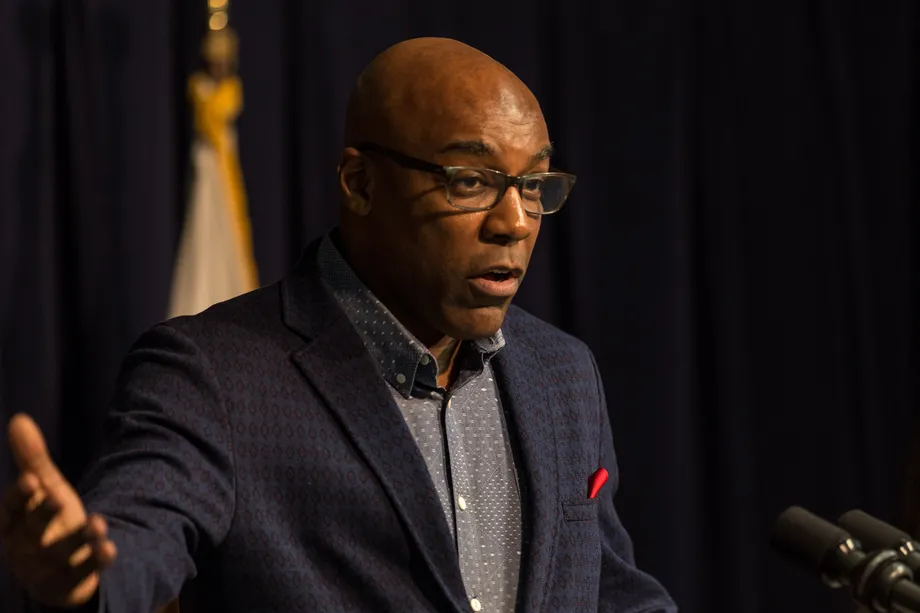Former Chicago police Officer Jason Van Dyke and his attorney Daniel Herbert listen to the proceedings during Van Dyke’s sentencing hearing at the Leighton Criminal Court Building Friday, Jan. 18, 2019 in Chicago. (Antonio Perez/Chicago (Antonio Perez/Chicago Tribune/Pool) ORG XMIT: 3067691
01/24/2019, 05:51pm
By Andy Grimm
Illinois Attorney General Kwame Raoul’s office is “reviewing” the 6-year, 9-month sentence handed down last week to Jason Van Dyke for the murder of Laquan McDonald.
Cook County Judge Vincent Gaughan’s decision to sentence the 40-year-old former Chicago police officer to 81 months — a term which could be cut by as much as half, with credit for good behavior — stunned McDonald’s relatives and activists for whom the 17-year-old’s death had become a rallying cry.
A spokesman for Raoul, who was sworn in last week after serving two terms as a former state senator, said the office was conducting a review of the “record and the law” in the case.
Kwame Raoul | Sun-Times files
If the AG’s office were to intervene in the case, it would be unusual, but not unprecedented. The office has standing to intervene in nearly any criminal case, and if the AG is taking an interest in Van Dyke’s case, Raoul’s staff is likely looking for grounds to file what is known as a writ of mandamus, seeking to have the state Supreme Court rule that Van Dyke’s sentence violated state sentencing laws.
Raoul, or Special Prosecutor Joseph McMahon, who prosecuted Van Dyke, could seek the writ, said longtime defense attorney Stephen Richards, who closely followed Van Dyke’s trial and sentencing.
“The attorney general is, formally, the attorney of record in any case that goes before the (state) Supreme Court,” Richards said. “It’s usually only a formality, but they do get involved in a case that could involve the entire state.
“That said, I have never heard of the attorney general getting involved in a case to challenge a sentence where the local state’s attorney didn’t want to push for it.”
Any challenge would have to be based on an argument that Gaughan made an error in sentencing Van Dyke, not just that Van Dyke’s sentence was not severe enough.
Gaughan’s sentence would seem a potential target, Richards said, not because it was shorter than some anticipated or hoped to see, but because Gaughan made an unusual— and possibly unlawful — decision on which counts Van Dyke was sentenced for.
Gaughan ruled that he had to sentence Van Dyke based on his conviction on a single count of second-degree murder, rather than on any of the 16 counts of aggravated battery with a firearm for which Van Dyke was also found guilty. Second-degree murder carries a sentence ranging from probation to a four- to 20-year prison term. Aggravated battery with a firearm carries a sentence of six to 30 years.
In court last week, Gaughan said based his decision on a state Supreme Court ruling that said Van Dyke had to be sentenced based on the most-serious count of conviction, which Gaughan ruled was second-degree murder, not aggravated battery. But his ruling was based on a concurrence to that ruling issued by a single judge, rather than the order drafted by the majority of judges who ruled on the case, Richards said.
But, in a brief statement ahead of announcing his statement, Gaughan explained that to his mind, it seemed logical that being murdered is a greater crime than being battered, said Richard Kling, a professor at ITT-Kent Law School.
If the AG were to challenge the sentence, it would have to be on the basis that the law clearly stated whether Gaughan had to sentence Van Dyke on the second-degree murder or aggravated battery counts, Kling said. But where the law is unclear, judges have discretion to hand out any sentence within the maximums and minimums in the law.
“And if there is not a lot of clarity in the law, the courts tend to say that it is within the judge’s discretion, and it is up to the legislature to clear up the laws,” Kling said.
Shortly after the verdict was handed down last week, McMahon did not seem inclined to challenge the sentence.
“It strikes a balance between holding Jason Van Dyke accountable, but also recognizing his service as a police officer as well as the fact that otherwise he has no criminal record,” said McMahon, who had argued for a sentence of 18 to 20 years.
In an email, McMahon’s spokesman, Chris Nelson said, “We are currently reviewing the trial court’s ruling in conjunction with the relevant case law and statutory authority that bears on the sentence imposed on Jan. 18. The unique facts of this case require consideration of the complex principles of Illinois law.”
Van Dyke’s lawyer, Dan Herbert, said the time for the attorney general to intervene was before Gaughan handed down his sentence. Van Dyke’s legal team had argued that Van Dyke should be sentenced on the second-degree count, not for the aggravated battery counts, a position spelled out in court filings in ahead of the sentencing hearing.
“It is disappointing that yet another politician has chosen to exploit the tragic death of Laquan McDonald for his own political gain,” Herbert said in a statement. “The Illinois Attorney General could have filed an amicus brief in response to our arguments. He did not. Now he suddenly has concerns after the sentencing in the wake of some public outcry. This is about politics not the law.”


